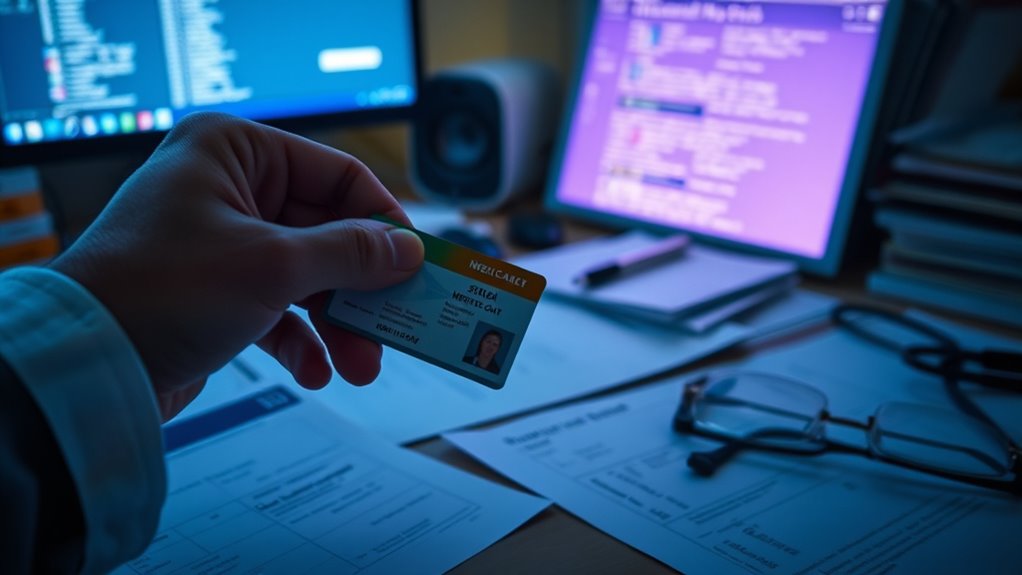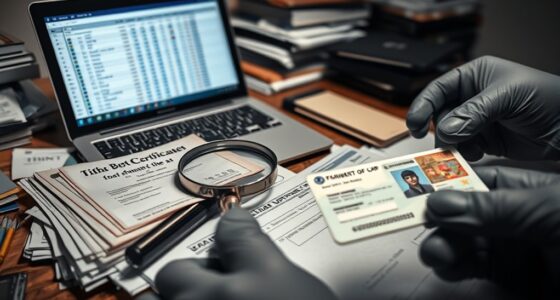Medical identity theft can seriously damage your finances and health by unauthorized use of your personal and insurance information. Watch for signs like unfamiliar bills, unexpected medical procedures, or suspicious entries in your medical records. These issues may also reflect in your credit report as unpaid healthcare debts. Staying vigilant and reviewing your medical and billing statements regularly helps spot problems early. Keep reading to discover more ways to protect yourself and stay a step ahead of fraudsters.
Key Takeaways
- Unauthorized use of personal health information can lead to fraudulent medical charges and altered medical records.
- Unfamiliar or suspicious medical bills, treatments, or providers indicate potential identity theft.
- Discrepancies in medical records or unexplained medical history changes suggest misuse of identity.
- Unexpected medical debts appearing on credit reports or collection notices are warning signs.
- Regular monitoring of EOBs, bills, and credit reports helps detect and prevent medical identity theft early.
Understanding Medical Identity Theft and Its Mechanisms

Medical identity theft happens when someone uses your personal information without your permission to access healthcare services or buy medical products. Fraudsters may submit false claims for treatments or medications under your name, trick insurance companies or government programs into paying for services you never received. They might impersonate you at healthcare facilities, receive treatments, and leave you with medical bills and damaged records. Sometimes, even healthcare providers fall victim if thieves steal their credentials to file fraudulent claims. This theft can corrupt your health history, leading to incorrect diagnoses or treatments later. The mechanism often involves stealing personal details like your name, insurance number, or social security number, then using this info to commit fraud while hiding their tracks. Understanding personal data theft is crucial for preventing such crimes and protecting your healthcare records. As machine learning algorithms become more sophisticated, they can also help detect unusual activity in healthcare billing, aiding in the fight against medical fraud detection. Additionally, data privacy challenges complicate efforts to secure sensitive health information against theft. Implementing strong security protocols and raising awareness about personal data security are essential steps in safeguarding your health information against theft and misuse.
Recognizing Unusual Medical Billing and Charges

Unusual billing patterns can be a strong indicator that your health identity has been compromised. If you receive bills for services you never had or notice charges for procedures or medications you didn’t authorize, it’s a red flag. Review your Explanation of Benefits (EOB) statements carefully—look for unfamiliar providers, dates, or treatments. Unexpected medical debts appearing on your credit report or collection notices also signal possible fraud. Be alert if your insurer denies coverage for conditions you’ve never had, or if you’re billed for appointments or tests you didn’t schedule. These discrepancies often point to someone using your identity for fraudulent medical services. Staying vigilant and regularly checking your bills and records can help you catch and stop medical identity theft early. Understanding the importance of privacy policy and data protection measures can further assist in safeguarding your personal health information. Educating yourself about medical billing practices can help you recognize suspicious charges more effectively. Additionally, familiarizing yourself with the different types of cookies used on healthcare sites can help you manage your online privacy and prevent unauthorized access to your medical data. Recognizing wicks and materials used in candle making can also serve as an analogy for understanding how personal information can be hidden or embedded within data systems, highlighting the importance of secure handling. Being aware of preppy dog names can help you identify patterns of naming that may be used in online profiles or social engineering tactics to target individuals.
Impact of Fraudulent Medical Debts on Your Credit Score
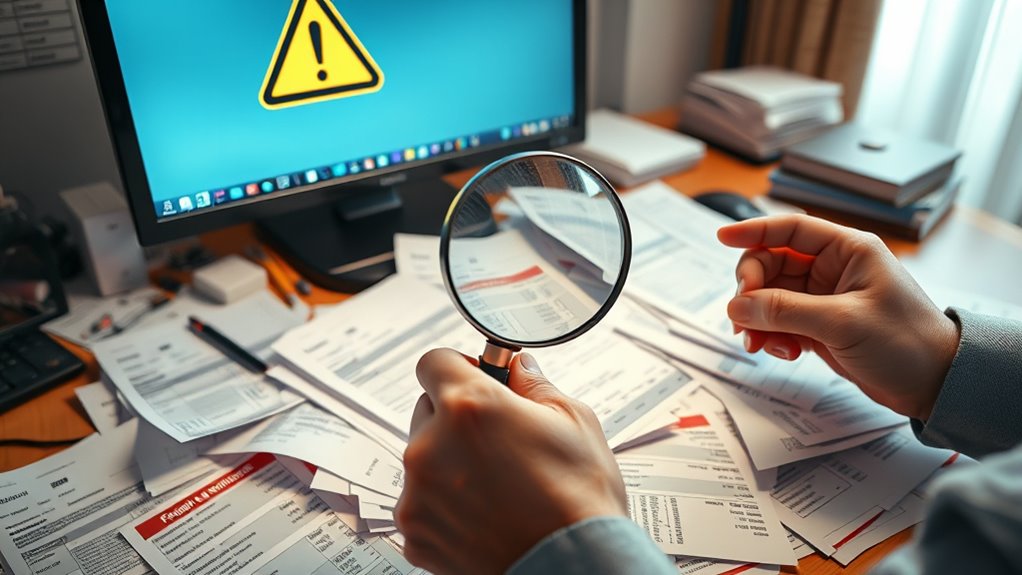
Fraudulent medical debts can considerably damage your credit score, making it harder to qualify for loans or credit cards. When false medical bills are reported, they lower your credit rating and create a negative credit history. Even if you dispute the charges later, the damage may persist until the debts are removed from your record. This can lead to higher interest rates and reduced borrowing power. Unpaid fraudulent debts may also trigger collection calls and further harm your creditworthiness. Additionally, insurers might deny coverage or increase premiums based on false medical histories, indirectly affecting your financial stability. Monitoring your credit reports regularly helps catch these fraudulent debts early, allowing you to dispute and resolve inaccuracies before they cause lasting harm to your credit profile. Being aware of resources and tools available can help you better protect your credit from such fraudulent activities.
Signs of Unauthorized Medical Services and Treatments
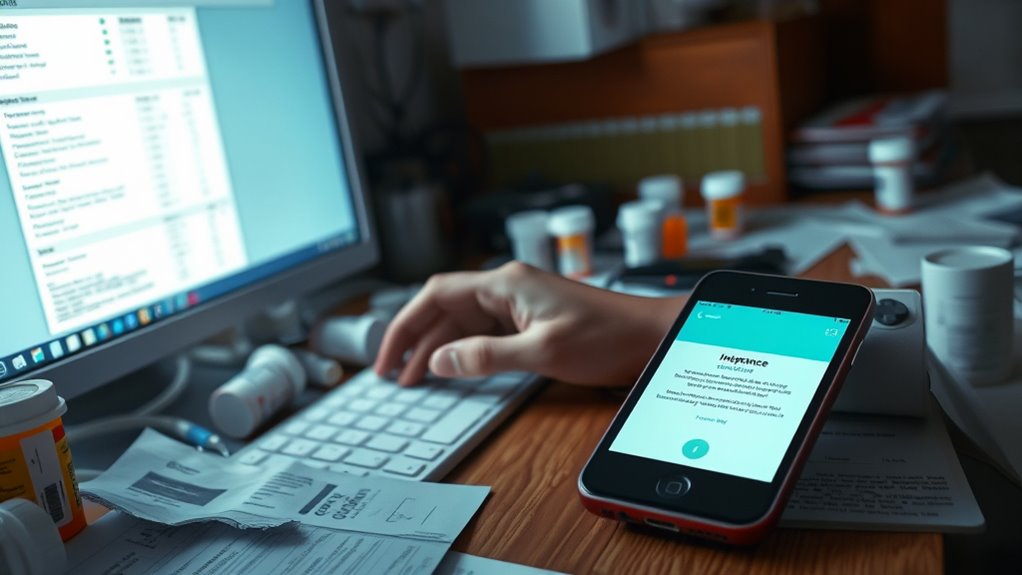
You might notice medical bills for services you didn’t receive or treatments that seem unfamiliar. These unexpected charges could be a sign that someone is using your identity to access healthcare. Stay alert to any unusual records or bills to catch potential fraud early. Additionally, unfamiliar or suspicious medical products or supplies can also indicate unauthorized activity. Being aware of the importance of color accuracy in diagnostics and treatment documentation can help in identifying discrepancies that might signal identity theft. Monitoring your medical records regularly can help detect unauthorized changes or entries, especially as relationship dynamics like emotional distance or secretive behaviors may sometimes be indicators of underlying issues such as identity misuse.
Unexpected Medical Bills
One of the clearest signs of medical identity theft is receiving unexpected medical bills or Explanation of Benefits (EOB) statements for treatments or services you never received. If you see charges for procedures, medications, or appointments you didn’t authorize, it’s a strong red flag. These bills may arrive months after the supposed service, or you might notice unfamiliar providers listed. Sometimes, the billed amounts are unusually high or include treatments that don’t match your health history. You might also get collection notices for debts you never recognized. Don’t ignore these alerts—review your bills carefully and compare them with your records. Checking your medical records regularly can help you spot discrepancies early. Contact your insurer or healthcare provider promptly to clarify or dispute any suspicious charges. Early action can help prevent further damage and uncover potential fraud. Staying vigilant about industry transformations can help you stay informed about emerging risks and protective measures in healthcare. Being aware of detection methods can further assist in identifying fraudulent activities early, especially regarding asset division if financial information becomes compromised.
Unfamiliar Treatment Records
Unfamiliar treatment records are a clear warning sign of medical identity theft. If you notice treatments, procedures, or visits you didn’t authorize or don’t remember having, it’s a red flag. Check your medical records regularly to spot any unfamiliar entries. These unauthorized records can indicate someone has used your identity to receive healthcare services. Such activity can lead to incorrect medical histories, affecting future care and insurance claims. Always compare your records with your personal recollections and bills. If you find discrepancies or unfamiliar treatments, contact your healthcare provider immediately. Reporting these issues quickly can help prevent further misuse of your personal information. Staying vigilant about your medical records is essential to protect yourself from ongoing fraud and potential health risks. Additionally, participating in internal company hackathons or other collaborative initiatives can help improve data security measures to better safeguard your medical information. Implementing secure data handling practices is crucial in preventing unauthorized access and ensuring the integrity of your records. Regularly reviewing your medical history can also help detect suspicious activity early.
How Healthcare Providers Can Detect Suspicious Activity

Healthcare providers can detect suspicious activity by carefully reviewing patient records and billing statements for inconsistencies or anomalies. Look for unfamiliar procedures, treatments, or provider details that don’t match the patient’s history. Scrutinize billing codes for unusual or excessive charges, especially those that seem unnecessary or out of scope. Cross-reference patient data with existing records to identify discrepancies, such as mismatched demographics or unexplained address changes. Keep an eye on sudden spikes in billing or new, unfamiliar provider entries linked to your practice. Regularly verify the legitimacy of new patient information and scrutinize any claims that seem inconsistent with previous records. Promptly investigating these anomalies helps catch potential fraud early, preventing further misuse of identities and safeguarding your practice’s integrity.
Monitoring and Detecting Medical Identity Theft
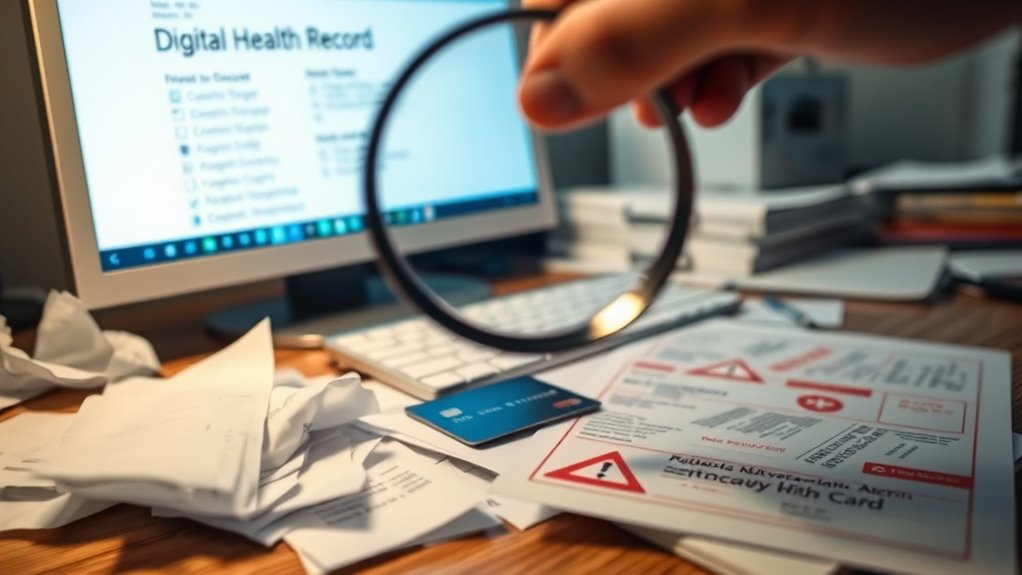
Monitoring your medical records and billing statements regularly is one of the most effective ways to detect signs of identity theft early. Carefully review your Explanation of Benefits (EOB) forms and bills for unfamiliar procedures, services, or medications. Keep an eye on your credit reports to spot any unexpected medical debts or accounts. If you notice benefits being denied or claims for treatments you didn’t receive, contact your insurer immediately. Set up alerts with credit monitoring services that include medical billing activity. Reporting suspicious charges or debt collection attempts promptly helps prevent further damage. Staying vigilant with your records and finances allows you to spot potential fraud quickly, making it easier to take swift action and minimize harm.
Steps to Take If You Suspect Medical Identity Theft

If you suspect medical identity theft, it’s crucial to act quickly to minimize potential damage. First, review your medical records, bills, and Explanation of Benefits carefully. Contact your healthcare providers to verify any suspicious charges or treatments. Notify your health insurer immediately about possible fraud. File a report with the Federal Trade Commission at IdentityTheft.gov and your local law enforcement. Keep detailed records of all communications and evidence. Consider placing a fraud alert or credit freeze with credit bureaus. Use identity theft protection services for added monitoring. Below is a summary of essential steps:
| Step | Action | Contact |
|---|---|---|
| 1 | Review records | Healthcare providers, insurers |
| 2 | Report fraud | FTC, law enforcement |
| 3 | Dispute charges | Credit bureaus |
| 4 | Protect credit | Fraud alert, freeze |
| 5 | Monitor activity | Identity theft services |
Preventive Measures to Protect Your Medical Information
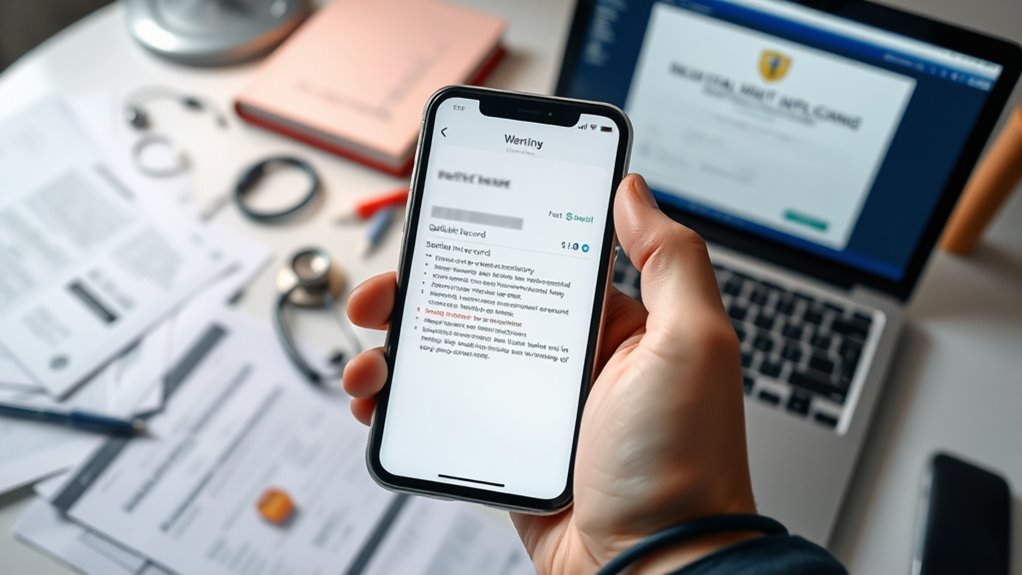
To effectively prevent medical identity theft, you need to take proactive steps to safeguard your personal information. Here are four key measures:
- Regularly review your medical bills and Explanation of Benefits (EOB) statements for unfamiliar charges or services.
- Monitor your credit reports frequently to catch any suspicious medical debt or accounts.
- Protect your health insurance information; never share your policy details unless with trusted providers.
- Contact your healthcare providers to verify your identity before any treatment or billing.
Collaborating With Insurers and Law Enforcement
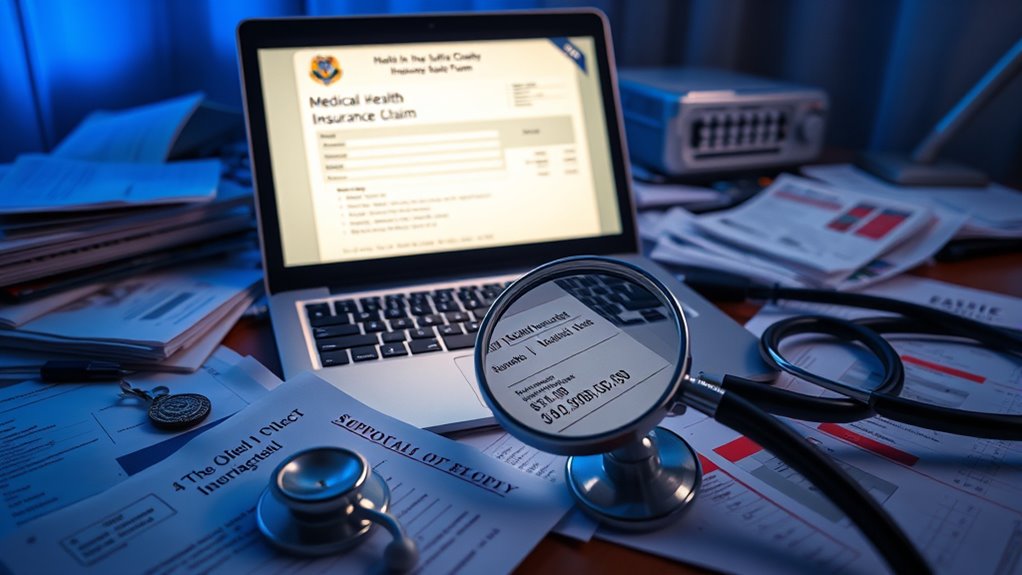
When you notice suspicious activity, it’s essential to report it promptly to your insurer and law enforcement. Coordinating with these entities helps initiate investigations and prevents further misuse of your medical information. Clear communication and swift action are key to resolving identity theft and protecting your health records.
Reporting Suspicious Activity
Reporting suspicious activity related to medical identity theft is a crucial step in stopping fraud and protecting your health and finances. When you notice signs like unexpected bills, unexplained medical debt, or denied insurance claims, take immediate action. Here’s what you should do:
- Contact your health insurer to report suspicious charges or benefits you didn’t authorize.
- Notify your healthcare provider about any unfamiliar patient records or treatments.
- File a police report to document the theft and assist with investigations.
- Report the incident to the Federal Trade Commission through IdentityTheft.gov to create an official record.
Prompt reporting helps authorities investigate quickly, prevents further misuse, and safeguards your records. Staying vigilant and proactive is key to minimizing damage from medical identity theft.
Coordinating Investigation Efforts
Effective coordination between healthcare providers, insurers, and law enforcement is essential for thoroughly investigating medical identity theft. You should share relevant documentation, such as medical records, billing statements, and claim histories, to identify discrepancies quickly. Establish clear communication channels so all parties stay informed and can respond promptly. Collaborate on tracing the fraudulent claims back to the source, whether it’s a stolen identity or compromised credentials. Law enforcement can assist with criminal investigations, while insurers can flag suspicious activity and block further fraudulent claims. As a healthcare provider or insurer, maintain detailed records of your findings and actions taken. This collective effort ensures a faster resolution, helps recover losses, and prevents future misuse of patient identities.
Resources and Support for Victims of Medical Identity Theft

If you suspect you’ve become a victim of medical identity theft, numerous resources are available to help you recover and protect your health and finances. Here’s where to turn:
- Contact your health insurer immediately to report suspicious activity and request a fraud investigation.
- Visit FTC’s IdentityTheft.gov to report the theft and access recovery tools tailored for medical identity theft.
- Request copies of your medical records and review them carefully for inaccuracies or unfamiliar services.
- Use credit monitoring services that include alerts for unusual medical billing activity to catch issues early.
Additionally, you can seek assistance from consumer protection agencies or local law enforcement. Staying proactive is essential to minimizing damage and restoring your financial and medical records.
Frequently Asked Questions
How Can I Verify if My Medical Records Have Been Altered Without My Knowledge?
To verify if your medical records have been altered without your knowledge, review your medical records and bills carefully for any discrepancies or unfamiliar entries. Contact your healthcare provider to request a copy of your records and compare them with your personal notes. Regularly monitor your patient portal, and if you notice anything suspicious or inaccurate, report it immediately. Staying vigilant helps catch unauthorized changes early and protects your health information.
What Specific Steps Should Healthcare Providers Take to Prevent Credential Theft?
Imagine your practice as a fortress, and your credentials are the keys. You should implement strong access controls, requiring multi-factor authentication for all systems. Regularly update passwords, monitor login activity, and restrict staff permissions to necessary levels. Conduct routine audits of billing and patient records. Educate staff on security protocols and warning signs of theft. By acting proactively, you seal vulnerabilities and prevent unauthorized access before damage occurs.
Are There Legal Protections Specific to Victims of Medical Identity Theft?
Yes, you’re protected by laws like the Health Insurance Portability and Accountability Act (HIPAA), which limits unauthorized access to your medical information. The Fair Credit Reporting Act (FCRA) also helps you dispute inaccurate medical debts on your credit report. If you suspect theft, you can file a police report and report it to the FTC. These protections help you recover and prevent further misuse of your medical identity.
How Effective Are Credit Monitoring Services in Detecting Medical Billing Fraud Early?
Credit monitoring services can be quite effective in detecting medical billing fraud early. They alert you to unfamiliar medical debt, credit inquiries, or account changes, helping you spot suspicious activity quickly. By regularly reviewing these alerts, you can catch fraudulent charges before they cause significant damage. However, stay proactive by also reviewing your medical records and bills personally, as monitoring services are an essential but not foolproof tool in protecting your health and financial information.
Can Medical Identity Theft Impact My Eligibility for Certain Health Programs?
Yes, medical identity theft can ruin your eligibility for crucial health programs overnight. Imagine losing access to life-saving treatments or coverage just because someone stole your medical identity and falsely claimed benefits. It can cause your medical records to be contaminated with incorrect info, leading to outright denial of essential services. Protecting your medical identity is essential; otherwise, you risk losing access to programs that could save your life.
Conclusion
Think of your medical information as the key to your health and finances. If a thief gets it, they’re like a hacker sneaking into your personal safe. By staying vigilant, recognizing warning signs early, and taking swift action, you can lock out identity thieves before they cause real damage. Protecting your medical identity is like guarding a treasure—your health and financial well-being depend on it. Stay alert and proactive to keep it safe.
